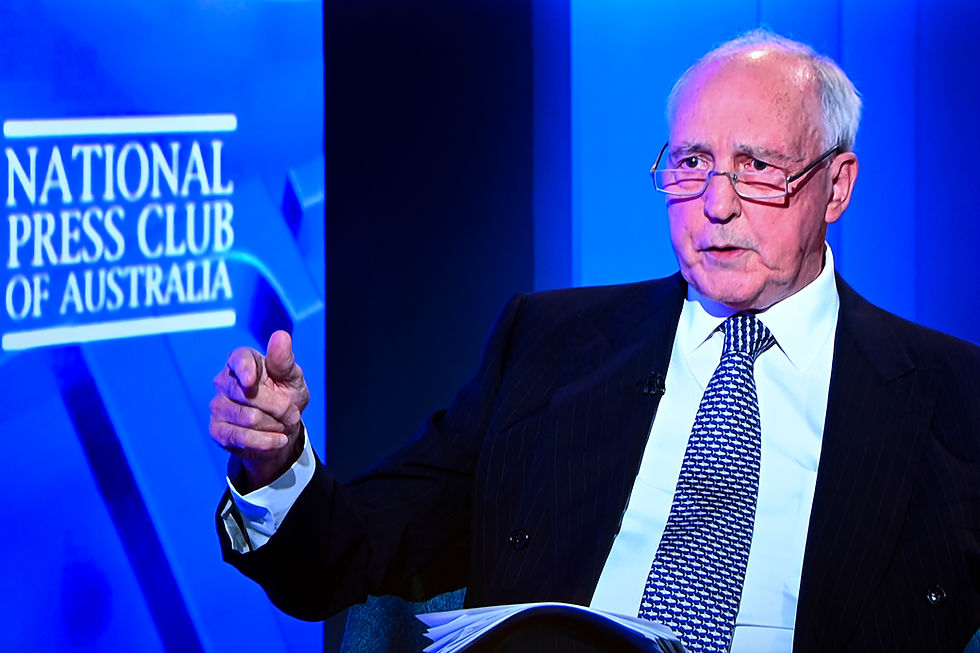Paul Keating outlines a different strategic framework
- John McDonnell
- Nov 10, 2021
- 3 min read

In an address in which he attacked both Liberal and Labor governments, Paul Keating told the National Press Club on Wednesday that Australia needed a more Asia-centric foreign and strategic policy.
The address was made in a somewhat idiosyncratic format where Mr Keating engaged in a conversation with ABC’s Laura Tingle using rough notes that he had compiled. In the course of the conversation, Mr Keating had a number of senior moments during which he forgot the names of people like Boris Johnson, Ronald Reagan, and Boris Yeltsin although he managed to remember all the names of Asian leaders no matter how obscure.
He started his address by saying that Australia should recognise that it was part of Asia and therefore develop security ties with Asia, not ties with the Anglosphere against Asia. From this perspective our most important neighbour and ally is Indonesia. The former prime minister pointed out that he had signed a security pact with Indonesia’s President Suharto just before he left office, but that John Howard had caused it to be revoked as a result of Australian action in East Timor. He said if Australia had stuck with the Indonesian pact we would now be embedded in ASEAN and have much more regional influence.
Mr Keating went on to criticise the Quadrilateral arrangement, which he said was built around a region that did not even exist. He argued that India had nothing in common with Japan, was oriented to the West not the East, had strong military ties with Russia and was part of the Shanghai Co-operation Agreement along with China and Russia. India would definitely not come to the defence of Taiwan.
He was scathing of the AUKUS agreement which he said was the product of three tired old minds in Cornwall, a place that had a negligible connection with East Asia. Keating commented that Australia’s acquisition of 8 nuclear-powered submarines to counteract the Chinese navy was like throwing toothpicks at a mountain and that if we had wanted to buy a state-of-the-art nuclear submarine, we should have gone with the French sub. This overlooks the fact that Labor would have opposed the acquisition of a French nuclear submarine because it would have necessitated the establishment of a nuclear industry in Australia.
The former Labor leader was also critical of Julia Gillard for initiating the US pivot into Asia during the Obama presidency.
With regard to China, Mr Keating said that people had to realise that the Chinese economy was 25% bigger than the US economy already and in 10 years it would be twice as big. In the circumstances, the US and Australia would have to reach an accommodation with China and respect it as the dominant Asian power. He said that Xi Jinping was not likely to want to expand his influence to the East or the South but into the countries to the West, ‘the Stans’. It was likely that by the end of the decade China would dominate Asia all the way to Istanbul. The Belt and Road Initiative was the main mechanism for achieving this. He said that China was in the adolescent phase of its foreign policy: full of testosterone and with an inclination to be rude. Notwithstanding this he did not believe there would be a conflict over Taiwan because that country would not declare it was independent of China and the mainland would not invade unless it did.
Keating argued that China was a supporter of the international rules-based order, which was evident from the fact that it had joined the WTO, the IMF, the World Bank and the WHO and had applied to join the Trans-Pacific Partnership. However, while it supported the basis of these organisations it wanted reform of them that recognised Chinese primacy in a globalised world.
In an interesting historical aside Mr Keating recalled that he had held a meeting with then-premier Zhao Ziyang and the Chinese Communist Party Secretary-General Hu Yao Bang in 1989. They had told him they wanted to open up the political system to parties other than the CCP and they were supported by then-leader Deng Xiaoping. He said the student demonstrations had put an end to that and Deng had decided to put the party before democracy.






Comments